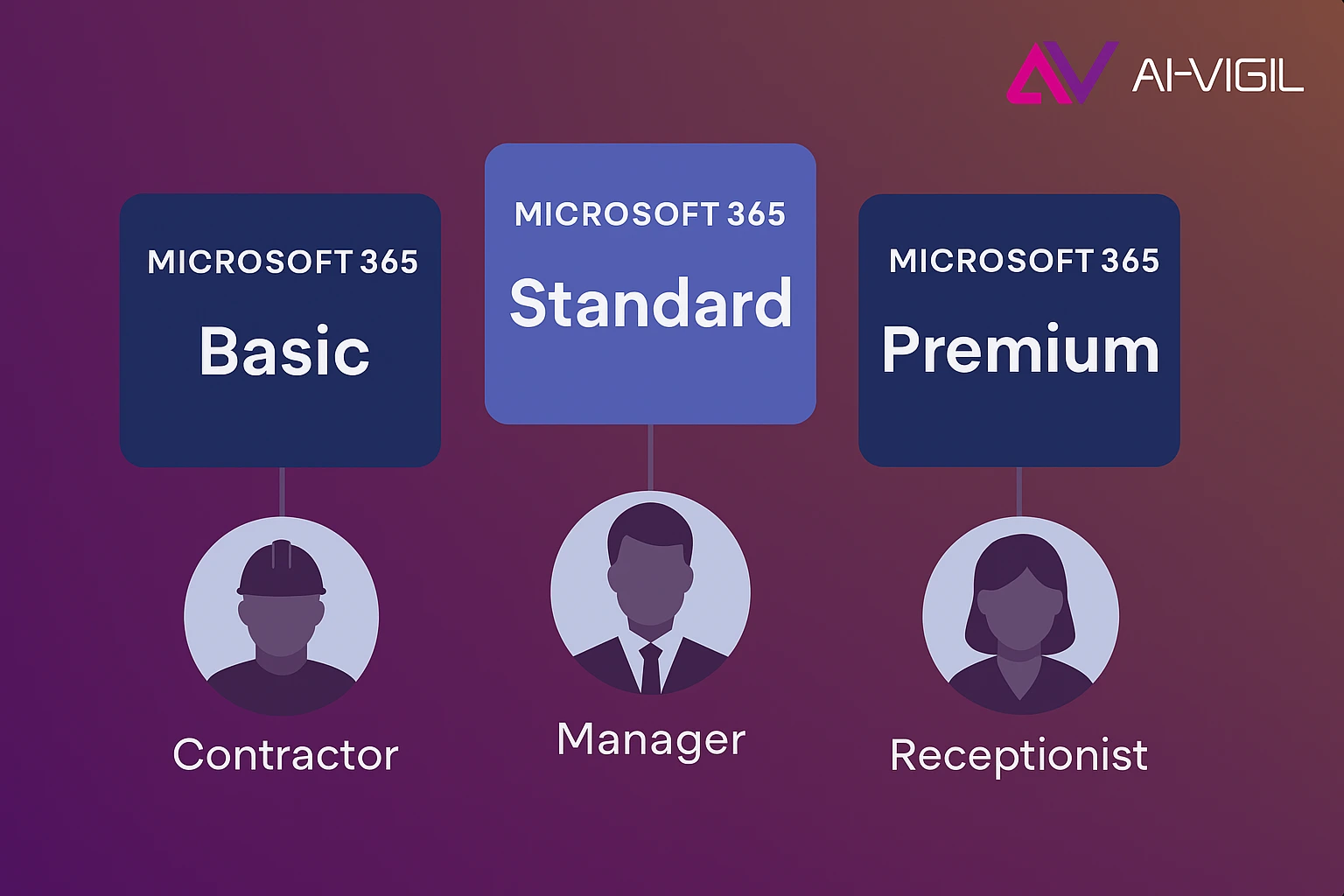I really did not have any clue we were still paying nine licenses to individuals who have moved off last year.
This is what one of our finance managers said to us in a client onboarding call, this spring. He was not new in office. He was not casual. He simply did not imagine that other people (HR, IT, operations) took that care of it.
They weren’t. Nor is he the only one.
In the past year, the small team of techies at AI VIGIL has audited Microsoft 365 environments of over 100 small and mid-sized businesses within the UK and beyond. We have worked with GPs, law firms, logistics, dental clinics, design studios, you name it. You know what we have turned up?
Almost the same licensing problems, time after time.
In this post, we will debunk the most popular (and most dangerous) of them: seven easy-to-spot pitfalls and how to fix them without feeling stressed, without a degree in technology, and sometimes even without investing more than an hour of your time.
It is not a textbook about theory. It is a reality check- and a cost saving one.
Purchasing Licenses That Were Dissolved
We may begin with the largest money leak of all which is licenses that ought to have been turned off months ago.
One of the employees quits. The paper work is filed by HR. Their M365 account? Still active. Their OneDrive, teams access and mailbox? Still live.
That is what it means:
- you are spending 5 to 22 pounds a month on somebody who is not on your business any more
- Their information could remain accessible and that makes the GDPR nightmare scenario to occur
- and without disabling MFA, and deleting credentials it leaves the system a backdoor to attackers
One of our clients is saving more than 1800 a year on pure saving by closing 7 old accounts that took just a few hours afternoon at AIVIGIL. I think we have observed this situation so many times, we start putting automated offboarding processes into the stack of each client as default functionality.
Giving Everyone the Most Expensive License “Just in Case”

This one is tricky.
You subscribe your team, and without spending time to match the licenses with real-life job requirements, everyone receives Microsoft 365 Business Premium. It is less hard to do. A license to govern all these, right?
Wrong.
We were dealing with a 45 people property company whereby each member, including the MD, and cleaner had Business Premium licenses. However, in the case of running usage reports? There are more than twenty employees who never used anything more than Outlook and Teams.
It should have been done with Business Basic. Just that mismatch was costing them more than 4000 pounds per annum.
Pro tip: create a license matrix. It is just a simple table that links the job roles to the right plan. We prepare these when we conduct audits and revise them after every three months. It will save you a lot of money–and will tighten up your people on just what they need.
You Also Shell out to Teams Rooms That No-One Utilizes
Everybody became hybrid a few years back. There were Teams Rooms installed in office meeting rooms, large screens, cameras and smart boards. Excellent theorically.
But now? One customer was continuing to service three Teams Rooms subscriptions… and one of those rooms had done nothing less than become a fancy supply closet.
Teams Rooms Standard licenses are priced around 11 sterling per month. Does not sound like much? It totals.
11 pounds x 12 months x 3 rooms = 396pounds per year.
And that is under the condition that there are no increases on prices. This is something that Microsoft is inclined to do every year.)
Solution? Include a fast walkaround audit into your every three months sys admin checklist. In case a screen has expired more than 30 days ago, there is a high chance of the screen having no active license.
You’ve Got Fancy Add-Ons Nobody Knows Exist
Visio. Project. Defender for Endpoint. Bookings. Viva. Microsoft 365 offers a long list of add-ons, and with many of them, it may simply remain unused.
At one point we had one healthcare client paying 18 licenses of the Visio. When we inquired to the team whether they had ever opened it? Blank stares. It happened that they purchased it three years earlier and forgot.
Hundreds–thousands even–paying quarterly on software that brings no value with it.
Fix it: Run a report of usage twice a year. The admin center at Microsoft provides you with app usage statistics, or you can get more granularity using, say Microsoft Productivity Score, or Graph API.
Confused by those reports? That is our role here. This is something that we normally audit.
Licensing is Messier Than Onboarding
Order, chaos, and so on. Due to the fact that onboarding chaos = license chaos.
This is what we observe very much:
- A new staff is employed and instead of asking about an inactive account, they are given a new license
- The temporary workers are allowed complete access, which is not removed once the contract has expired
- Renaming of accounts rather than reassignment is done, disorganizing audit trails and other security policies
A clinic that we serviced used to have 63 users in their admin center… yet 44 actual employees. It is close to a 30 percent license bloat.
The fix? Automated and documented procedures of onboarding and offboarding. These are constructed with the help of applications such as IT Glue and are embedded in the client portals we create.
Thinking Microsoft Handles Backups (They Don’t)
This is a smarting blow.
We have received a few desperate calls of businesses telling us, We have lost a client folder. Is it salvageable by Microsoft?
Most likely not.
Microsoft 365 does have static retention policies, yet it is not a proper backup solution. Deleted files or mail are gone after thirty or ninety days. When one clicks the delete permanently option, that is it.
No garbage basket. No recover point. Not a second chance.
We advise to combine M365 with the third-party backup, such as Datto SaaS Protection. It renders you:
- Single restores (email restores or file restores)
- Point-in-time backups
- Ransomware Rollback choices
To know more about the shared responsibility model offered by Microsoft, read:
You have not conducted an audit within 12+ months
This is elementary. In case you never checked your Microsoft 365 licenses, accounts, and usage more than a year ago, you are almost surely over-spending.
What are you confident to answer?
- What is the count of active licenses?
- What is the plan of each of them?
- What are the used apps and add-ons?
- Do you have any inactive accounts?
- Which protection security are enabled?
Failure to reply to all of the five questions will mean that an audit is in order.
What These Mistakes Are Really Costing Small Businesses
It is not nickels and dimes. These are actual saving we have been able to unearth with clients:
- A reduction to Basic licenses to save 10 Business Premium licenses will cost 1,280 actual cost per year.
- £4,400 through cancelling 13 idle accounts and transferring 11 people to role-suitable plans
- Cancelling unutilised Teams Rooms and Visio add-ons, will save 2,100 in a year
And that is without even mentioning better security positioning and less IT headaches.
This month promotion: 20 percent discount + M365 audit free of charge
We’re offering:
- 20 percent off of 3 months with AIVIGIL
- Complimentary on-boarding + licensing clean-up
- Microsoft 365 usage, apps, add-ons, backups audit
Why? Since we feel that you deserve clarity– not complexity. And you should not require a doctorate on licensing to prevent wastage when you are in the business.
Read more about our AI-Vigil Microsoft Services here
Summary
It is not a matter of blaming. The setup in most small businesses was inherited as being messy. However, you are the one losing money, giving up data, and adhering to the rules.
Let us streamline it, release some budget, and equip your people (and the security) with what they really require. A single 30 minute call can save thousand dollars. It is time to make Microsoft 365 work smarter on behalf of your business and not vice versa. Book your free Microsoft 365 license audit and stop overspending today.
5 FAQs About Microsoft 365 Licensing for Small Businesses
Do I necessarily have to buy the same Microsoft 365 license to all the employees?
Nope. One of the greatest errors we get is that. All people may not require the very costly plan. Your part-time worker or email only worker does not require the same kinds of tools as your finance manager. license to the reality of the job: it will cost you less and nothing will be taken away.
How can I tell that we have overpaid for Microsoft 365?
So, if you or your company have never conducted a license audit (or even more than one year ago), you are most likely paying too much. The red flags that are most frequently encountered: aged employees who still appear, add-ons at high prices which are not being utilized and blanket assignment of licenses. This audit is free by the way.
Doesn t Microsoft cloud back stuff up?
Not quite. Microsoft 365 does offer a little bit of retention, although it is not an actual backup. In case a file or even an e-mail is irrevocably deleted or irrevocably erased, it may have disappeared forever. We would never mind giving a third-party backup tool in case we fall on the wrong side of the fence.
How does anyone clean all this up easiest?
Begin by a license usage report. It is going to tell you who uses what. Then see who did not leave the business, what tools are still not opened and where the license is disconnected with the position. Wish you some assistance? Of course, we will help you do the audit, cleanup, and onboard it.
Is it actually possible to cut costs and not CUT TOOLS that my team uses?
Absolutely. It is not about cutting tools, but using right ones. Mostly, our customers come out tops with improved security, less headache, and reduced expenses. We assist in ensuring that all licenses are working.






